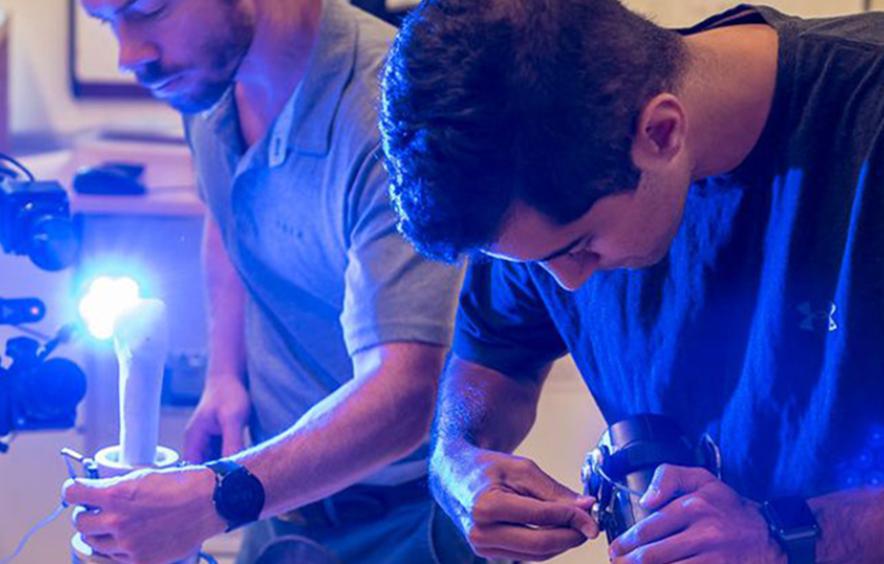Our Master of Science in Bioengineering program integrates engineering with biomedical science to help prepare you for a career in bioscience research and development. You will explore a variety of medical treatments and devices, including biomechanical smart devices and wearable technologies. Our curriculum also includes courses in advanced engineering mathematics, reliability and optimization. A cross-disciplinary degree between the Ritchie School of Engineering and Computer Science and the College of Natural Sciences and Mathematics, we welcome everyone with an engineering, chemistry, biological sciences or physics background.
The goal of our program is to provide both the industrial requirements and the desired qualifications of a revitalized workforce in bioengineering. A particular focus in our program is addressing the challenge of aging. Coupling in-class learning with clinical practice, you will find opportunities to work in either the Center for Orthopaedic Biomechanics or the Knoebel Institute for Healthy Aging. As a program graduate, you can pursue opportunities with bioscience companies in the private sector or work to apply your knowledge and expertise toward further graduate studies, as well as nonprofit and academic research. This program is ideal for students with bachelor’s degrees in chemistry, biological sciences or physics, as well as those with accredited engineering degrees.
Start Dates: Fall, Winter, Spring or Summer
Curriculum: 45 Credit hours completed in quarter terms
Program Length: 2 Years
Master in Bioengineering
How our curriculum prepares you for your career in bioengineering
A cross-disciplinary degree that prepares you for the 21-century workforce
Our cross-disciplinary MS program will address the industry requirements and qualifications for a career in bioengineering.
Acquire specialized expertise in bioengineering
Our program is open to students with bachelor’s degrees in chemistry, biological sciences or physics, as well as those with accredited engineering degrees. You will gain expertise in bioengineering through curriculum which leverages and builds upon your undergraduate experience.
Participate in research
Gain experience by participating in active research in the fields of biomechanics, orthopedics, cardiovascular engineering, biofluids, human dynamics and more.
Thesis or non-thesis study options
You can select a thesis or non-thesis option to develop research skills alongside faculty or increase your knowledge through additional coursework.

Work on real-world projects through faculty partnerships with industry partners
You will work directly on current bioengineering projects through partnerships formed by DU bioengineering faculty and the local biotech industry.
Request for Information
Application Information
Bioengineering Core Courses
- ENBI 4500 - Biofluids
- ENBI 4510 - Biomechanics
- ENBI 4520 - Introduction to Cardiovascular Engineering
- ENBI 4530 - Biomechanics of Human Movement
- ENBI 4200 - Medical Device Development
- ENBI 4800 - Advanced Topics in Bioengineering
Advanced Math Courses – 3 Credit Hours
- ENGR 3620 - Advanced Engineering Mathematics - Corporate
- ENGR 4300 - Advanced Numerical Methods
- ENGR 4350 - Reliability
- ENGR 4620 - Optimization
- ENGR 4765 - Robot Control
Required Core Courses for MS – 9 Credit Hours
- ENME 4900 - Graduate Professional Development
- ENME 4950 - Graduate Assessment

Get Started on Your Master of Science in Bioengineering
Build your career in bioengineering with a master's degree from the University of Denver’s Ritchie School of Engineering and Computer Science






